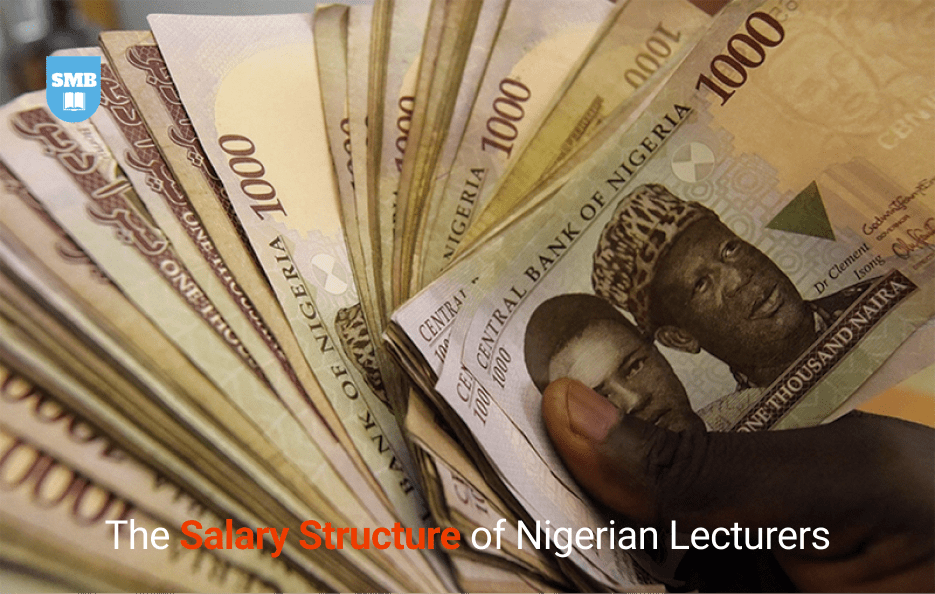
If there’s one thing students are curious about regarding lecturers, it’s how much their universities pay them. In Nigeria where people look down upon the teaching profession because of the salary, it is interesting to know lecturers are exempted. Why? Because a lecturer is paid better. But how true is that?
Before we go further, let’s take a look at common popular beliefs about Nigerian lecturers:
- Lecturers get a higher salary than teachers.
- Lecturers have more access to learning opportunities than teachers.
- They have more flexible teaching schedules than teachers.
- Once they decide to fail a student, not even the university body can stop them.
- They are free to decide whether to attend a class or not.
In the eyes of a typical Nigerian student (and others), one thing is for sure: Lecturers are enjoying!
Levels of Nigerian Lecturer’s Salary
According to the salary explorer, a lecturer’s salary ranges from 245,000 NGN (lowest) to 702,000 NGN (highest). This includes housing, transport, health, and other benefits.
Also, the salary structure of some Nigerian lecturers per annum includes:
- Lecturer II 1,649,509 NGN
- Lecturer I 2,079,996 NGN
- Senior Lecturer 3,091,505 NGN
- Reader 3,768,221 NGN
- Professor 4,580,349 NGN
Note, however, that a lecturer’s pay is based on several factors, which include:
1) Nigeria Lecturer’s Salary Based on Experience
This is the most important factor considered, and it is classified based on years of experience.
- Less than 2 years: A lecturer under this category is paid 281,000 NGN per month.
- 2 – 5 years: A lecturer earns 345,000 NGN per month, 23% more than a lecturer with less than two years.
- 3 – 10 years: The institution pays the lecturer 489,000 NGN, 42% more than they pay a lecturer with two to five years of experience.
- 10 – and 15 years: They earn 572,000 NGN,17% more than lecturers with five to ten years of experience.
- 15 – 20 years: A university pays the lecturer 629,000 NGN, 10% more than they pay lecturers with ten to fifteen years.
- More than 20 years: A lecturer earns 665,000 NGN, 6% more than lecturers with fifteen to twenty years of experience.
2) Salary Structure of Nigeria Lecturers Based on Education
A lecturer with a Master’s degree earns 386,000 NGN while a Ph.D. holder earns 615,000 NGN, 59% more than the former. Additionally, a lecturer with a Bachelor’s degree is paid 24% more than a lecturer with a Diploma, who earns 17% more than a lecturer possessing only a secondary school certificate.
3) Gender Influence on Lecturer’s Salary
Although gender shouldn’t have to play a role in determining salary, unfortunately, it does. In Nigeria, a male lecturer earns 487,000 NGN, which is 16% more than a female lecturer who earns 420,000 NGN per month. Furthermore, in all career fields, men earn 7% more than women.
4) Salary Variation Due to Location of Nigerian Lecturers
A lecturer’s location also determines how much they get paid, as each state’s pay range varies.
State Average Salary
- Benin 422,000 NGN
- Ibadan 464,000 NGN
- Kaduna 463,000 NGN
- Kano 503,000 NGN
- Lagos 496,000 NGN
Great, But What about Salary Increment for Nigerian Lecturers?
Salary increment varies from person to person, based on the role they play or how much contribution they have made to the progress of the institution. In Nigeria, the average salary increase in a year is 5%.
Other Interesting Facts Include:
- A lecturer’s average wage per hour is 2,660 NGN.
- The average lecturer’s salary is 28% more than Teaching/Education, which is 6% more than other jobs.
- Lecturers in private institutions are paid more than those in Federal/state universities.
As you look forward to earning big as a lecturer, know that this job, just like every other, has its challenges. Some of them are:
- Poor motivation
- Teaching a large population
- Lack of staff development programs
- Incessant strike actions
- Poor computer literacy, etc.
So be sure to prepare yourself to enjoy your lecturing job to the fullest.
Did you find this article helpful? Share your views with us in the comments section. Good luck.
About the Author
Fatima Ibrahim Uthman is a dreamer, not the type that just sits and creates scenarios all day, but the type that tries to make them real through storytelling with the hope of positively impacting the world.
